Ecommerce transactions which are the process of buying goods online are rising globally and can be broadly classified into three types which are business-to-business (B2B) marketplace, business-to-consumer (B2C) marketplace, and consumer-to-consumer (C2C) marketplace.
More permutations and combinations can be made out like business-to-business-to-consumer (B2B2C) where a business buys from another business and eventually sells to the consumer, and transactions with the administration.
While it might sound surprising, the B2B ecommerce marketplace where businesses buy and sell goods and services among themselves is the biggest component of the overall ecommerce market and the global B2B ecommerce market size is expected to reach $25.65 trillion by 2028.
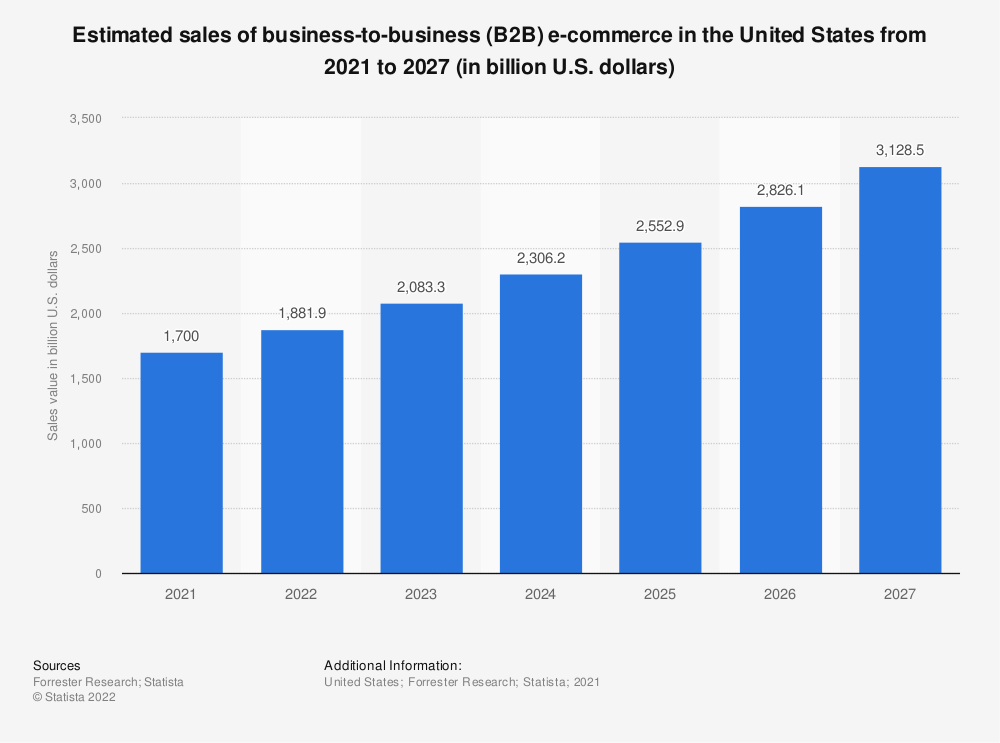
In this article, we’ll do an in-depth review of B2B marketplaces and compare some of the leading B2B marketplaces.
What Is a B2B Ecommerce Marketplace?
In a B2B ecommerce marketplace, a business transacts with other businesses. In other words, it is a digital platform where businesses buy goods and services from other businesses.
The number of buyers in a B2B ecommerce marketplace is usually much smaller than in a B2C marketplace as the audience is quite limited. B2B transactions – which include both offline and online transactions – are invariably higher than B2C transactions.
For instance, the total number of B2B product sales in the US was estimated at $16.27 trillion in 2023. To put that in perspective, the total US GDP was just above $25 trillion during the period while total US retail sales were $7.1 trillion over the period.
The total B2B ecommerce transactions in the US are expected to surpass $2 trillion in 2023. Things are no different globally and Research And Markets expects the global B2B ecommerce market to rise to $25.65 by 2028 – which is thrice the $7.65 trillion that the B2C ecommerce market is expected to reach by then.
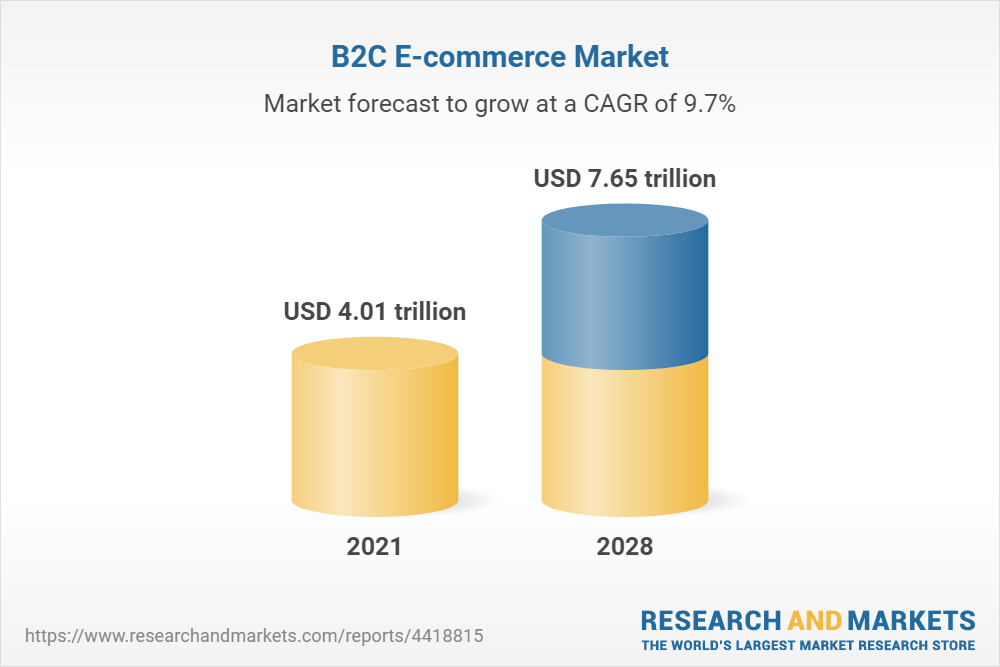
Advantages of B2B Ecommerce Marketplaces
There are some inherent advantages of a B2B marketplace. These include
- Markets and customer acquisition costs are lower in a B2B marketplace as compared to a B2C marketplace.
- By opting for a B2B ecommerce marketplace, companies can increase their reach. One example could be Peloton which started selling its fitness equipment through Dick’s Sporting Goods. It also started selling on Amazon which help it buoy sales. In a B2B marketplace, customer acquisition and marketing costs are borne by the reseller.
- Volumes per order are typically higher in the B2B ecommerce marketplace as compared to B2C as businesses tend to buy in bulk. This also helps in building loyalty with buyers which eventually leads to better sales visibility as against selling to the consumers where sales can be quite unpredictable.
- Also, a B2B ecommerce marketplace would help connect better with overseas customers thereby increasing the total market potential.
Disadvantages of B2B Ecommerce Marketplaces
As always there are two sides of a coin and while the B2B marketplace has its own set of advantages, there are disadvantages too. For instance, it is relatively complex to set up a B2B ecommerce marketplace and the initial acquisition costs might be higher.
Also, a B2B ecommerce marketplace can have a small set of buyers accounting for the bulk of revenues. This would make retention of key customers critical as a loss of even a few big customers can have a significant impact on revenues.
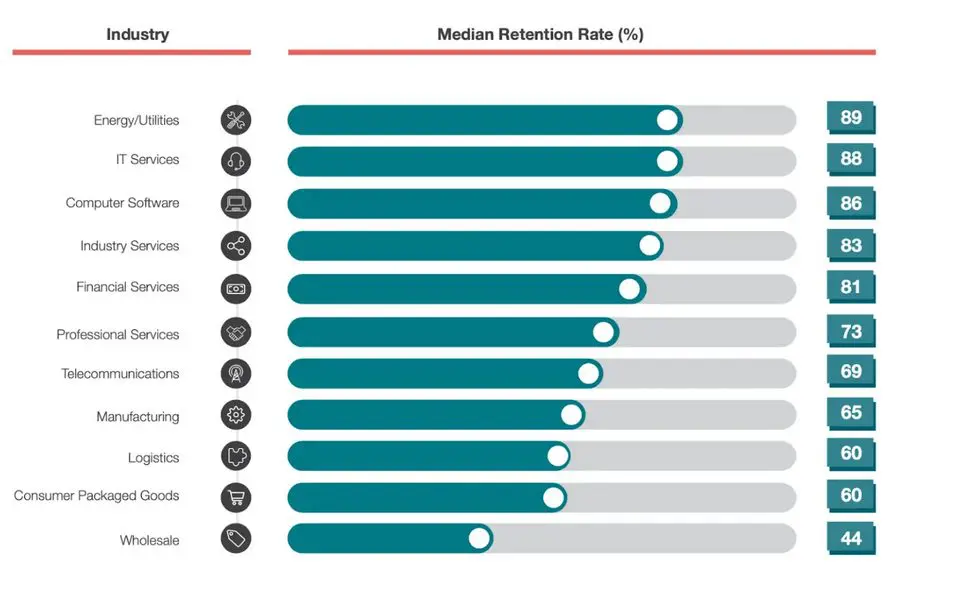
Incidentally, the customer churn rate in wholesale which is a good proxy for the B2B ecommerce marketplace is 56% which is quite high. Finally, a B2B ecommerce marketplace misses out on individual retail customers who are a big market.
What to Look for in the Best B2B Ecommerce Marketplaces
While looking for the best B2B ecommerce marketplace, it would be pertinent to look at the following.
- Commissions and other fees can eat away at the profits so it is prudent to analyze all the costs including commissions, any initial deposit fee, and subscription fees.
- The platform should provide customer fulfillment support as well as advertising and marketing support to improve visibility on the platform. It should also provide data and other analytical insights to improve sales.
- The ease of use for your business as well as prospective customers is quite important in a B2B ecommerce marketplace and among others, it should offer a unified system for managing orders as well as multiple payment options.
- Support for mobile apps is also getting increasingly important as the app economy continues to grow. Total mCommerce or buying and selling goods through handheld devices like smartphones has risen and accounted for 6% of total retail sales in the US last year.
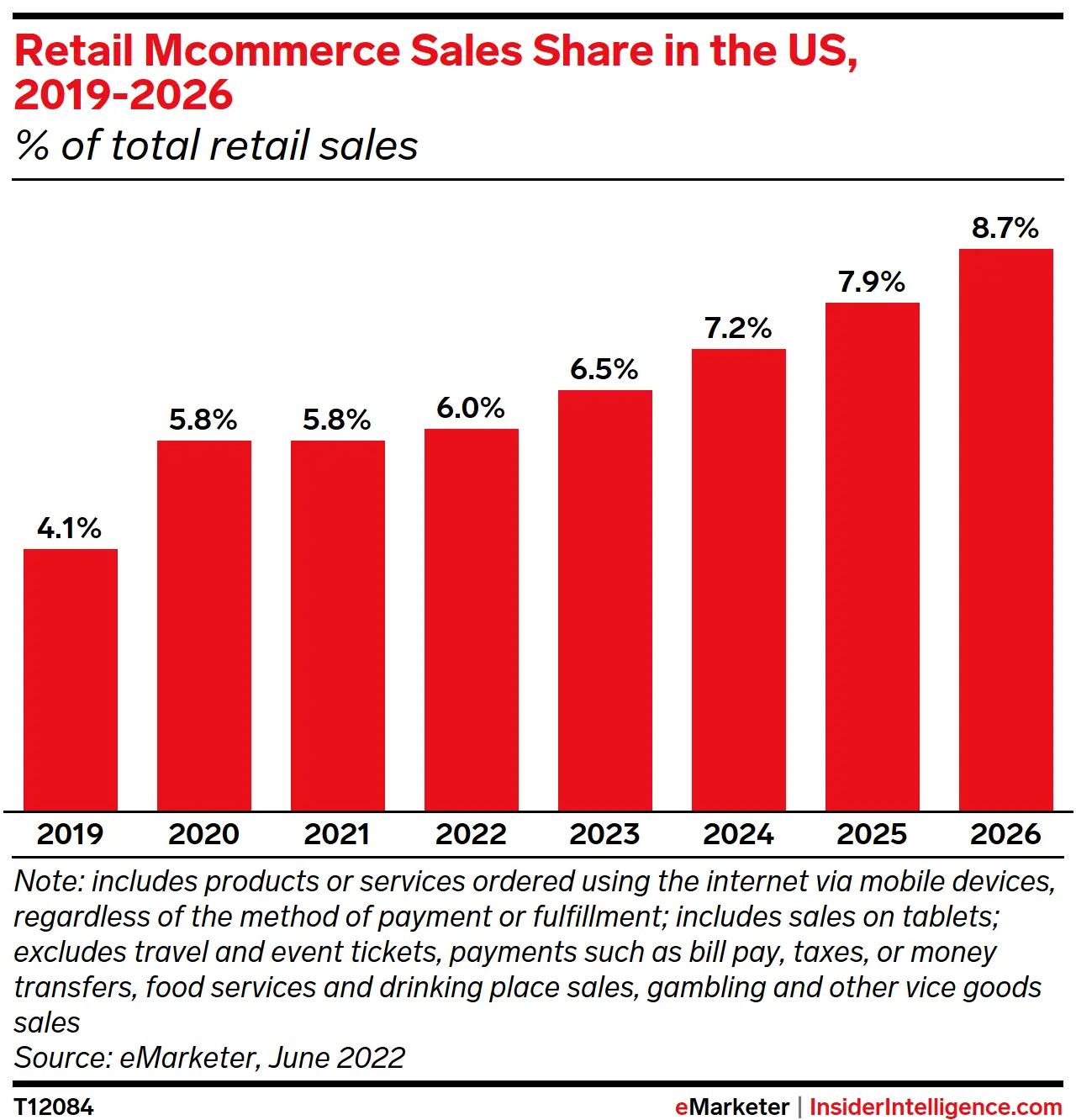
Best B2B Ecommerce Marketplaces
The following are some of the best B2B marketplaces to choose from
1. Amazon Business
Amazon Business is among the best B2B marketplaces due to its incredible size, variety, ease-of-use, and more. The platform offers a diverse suite of products to choose from and like the B2C ecommerce platform, it also has a Prime plan or the B2B marketplace where it offers free shipping coupled with 5% cash back on purchases. It offers multiple delivery and payment options including a line of credit.
According to Amazon, 96 of the Fortune 100 companies use the platform and over 5 million businesses globally use the platform. The platform is also popular among local governments with 90 of the 100 most populous local governments using the platform.
The platform also uses AI and ML and the functionality might only increase in the coming months as tech companies including Amazon are making new strides in AI.
It also aids sponsored ads and helps businesses improve their listings. Amazon’s advertising revenues have incidentally been rising at a brisk pace and reached $37.7 billion in 2022.
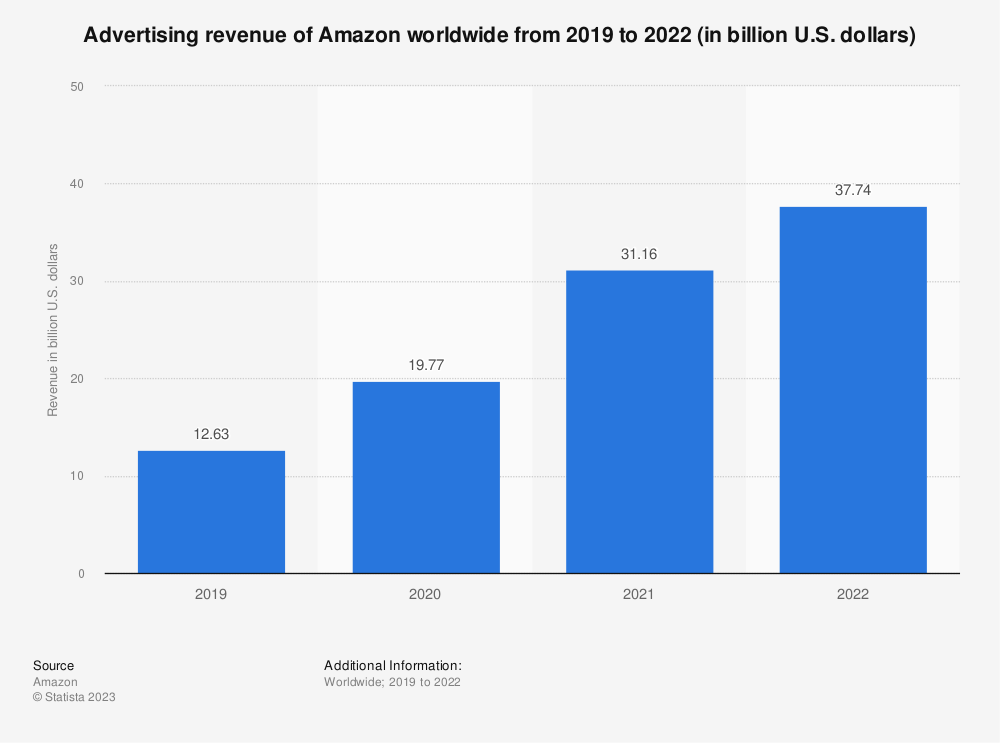
Amazon has a global reach and a strong brand which helps reach a global audience and also leverages the ecommerce giant’s vast logistics network which is one of its key strategic advantages. 15% of buyers in the US and 20% in the UK already use Amazon Business.
The platform is best for users who want to monitor their spending across multiple users and are looking at connecting with multiple suppliers.
2. eWorldTrade
eWorldTrade boasts of being the fastest-growing B2B ecommerce and has over 500,000 registered users globally. The platform is available in several regions including the US, China, and India. It also has verified buyers and a 24/7 help center.
It offers five packages to choose from which offer different functionalities. The eLite membership for instance offers access to buyer inquiries and an option to showcase up to 10 products. The next tier is the Gold membership which allows access to verified buyer inquiries and provides a yearly performance and buyer report.
The final tier is Exclusive membership which allows access to connected Grade A buyers and provides a weekly or monthly performance and buyer report. The prices for these tiers range from $399 annually for eLite and $7,999 for the Exclusive membership.
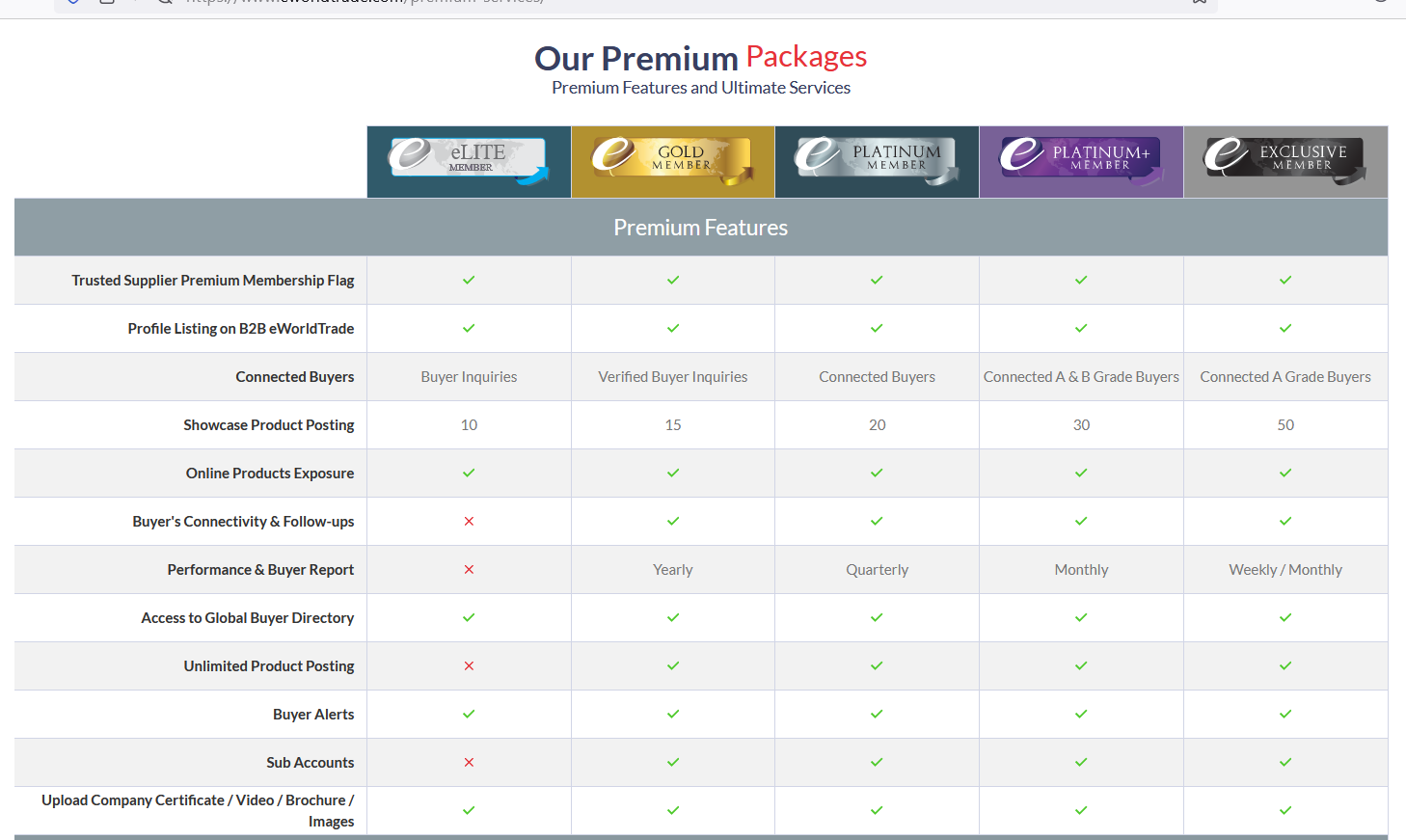
The platform has an interactive page that lets buyers and sellers easily connect with each other. The platform looks best for users that are looking at multiple membership options suiting the size of their business. This especially holds true for small businesses as its cheapest membership tier starts at just $399.
3. Alibaba
Alibaba was launched in 1999 and the company listed on the US markets in 2014. It is among the best B2B platforms globally, especially for those businesses that are looking to buy from China. The country is the world’s biggest exporter and offers low-cost products that a lot of businesses might be looking for.
Alibaba also has Taobao, Tmall, and AliExpress B2B platforms and helps businesses reach thousands of retailers globally. It is a one-stop sourcing platform and offers millions of products to choose from.
It offers membership plans between $3,499 to $6,999 and also offers complimentary advertising credits. Overall, Alibaba’s B2B ecommerce marketplace would work well for those users who are looking to source from China and other Asian countries, including those who want to buy industrial-grade products.
4. Flaire
Flaire offers over 100,000 independent brands and has 700,000 retailers on the platform. It’s a relatively new entrant in the B2B ecommerce marketplace and launched in 2017 only. The platform is especially popular among small businesses and helps retailers connect with independent brands globally.
The platform lets users email buyers through the Flaire dashboard and also offers buy-now-pay-later functionality to buyers on the platform.
One of the biggest advantages of Flaire is that it does not charge a fixed subscription fee but the flip side is that its commission on B2B orders is quite high and the standard fee is 15%.
Overall, Flaire’s B2B ecommerce marketplace is best suited for small businesses especially those in the home décor, beauty and wellness, food and drinks, and clothing businesses.
5. Novi
Novi is a female-founded company that offers a data-driven B2B ecommerce marketplace. It’s a free platform that offers raw materials for businesses and helps connect with businesses that share the same values.
The platform is especially appealing to businesses that are looking for sustainable ingredients and packaging. It also offers much more transparency as compared to most other B2B ecommerce marketplaces which is its USP.
With ESG and sustainability getting popular by the day, Novi is one B2B ecommerce marketplace that looks like a good bet.
Tips For Using a B2B Ecommerce Marketplace
While using a B2B ecommerce marketplace to sell your products, there are a few tips that can help increase sales.
- Firstly, the product description should be persuasive and let the user know how the product fits their needs. Additionally, the product photographs and videos should reflect professionalism and help the user completely understand the product. The description and media should provide all the information and data to the prospective buyer which would help them take an informed decision.
- Secondly, the sellers should try to understand what buyers are looking for and come up with appropriate products.
- Finally, given the increasing competition on B2B marketplaces, it might be prudent to invest in advertising on the platform which can help increase the product’s visibility.
How to Start Using a B2B Ecommerce Marketplace
Once you choose the correct B2B ecommerce marketplace for your business, the next logical step would be to try and connect with interested buyers with careful marketing or just networking. Reaching out (whether directly or through advertisements) to prospective buyers is often vital. Responding to inquiries in a timely and professional manner is also important.
Since the two businesses don’t know each other and haven’t interacted in person, communication through email inquiries could make all the difference between a sale and a lost opportunity. It would be pertinent to be mindful of the regional sensibilities also as the buyers and sellers might be of vastly different backgrounds.
Another logical step could be to offer sample products or offer the buyer a lesser quantity of the product than your usual minimums. This can help build trust and foster long-term partnerships.
Finally, the sellers can ask buyers to leave feedback which would not only help them improve their services but also let other potential buyers choose the right business for their sourcing needs.